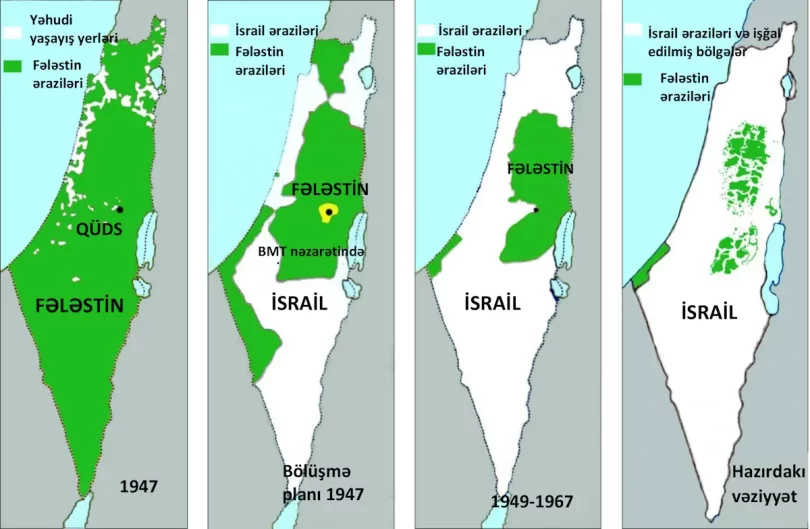When Zionists tell you who they are, it’s hard to believe them.
by
One of the worst ideas we’ve inherited from modern identity politics is the idea that people have “lanes.” That having a particular set of identity traits grants expertise on particular issues.
White people shouldn’t talk about racism, men have nothing to offer feminism, lesbians will remain an eternal paradox for gay men, forget empathy and conversation and our common human experience, just keep your head down, keep your mouth shut, and stay in your lane.
Given that I’m neither Israeli nor Palestinian, yet inexplicably find Israel’s televised, Occident-funded Palestinian massacre objectionable, I’ve received more than my share of criticism for breaking this rule.
So, in the spirit of #doingthework, I’ve decided to step back and let the people who created this mess speak for themselves.
After all, if you are going to have an opinion about Zionism, you should at least listen to some Zionists first.
The first step in my quest to #educatemyself about Zionism was to relearn what Zionism is.
Because while I once foolishly thought of Zionism as a violent settler-colonial project justifying itself with God’s three-millennia-old promises, or the bizarre belief that because some Jews lived in Palestine for centuries, all Jews, from anywhere in the world, have an “inalienable right” to displace Palestinians who also lived there for centuries, Haaretz, informs me that a Zionist is simply, “a person who desires or supports the establishment of a Jewish state in the Land of Israel.”
And what could go wrong? Israel was “a land without a people for a people without a land,” right? Just ask Israeli historian and former Knesset member Michael Bar-Zohar:
The simple truth was that Palestine was not an empty land, and the Jews were only a small minority of its population. In the days of empire-building, the Western powers had dismissed natives as an inconsequential factor in determining whether or not to settle a territory with immigrants […] the concept of self-determination was still reserved exclusively for the developed world.
Oh…okay, maybe Palestine wasn’t completely empty, but it’s a big place, and Jews and Muslims had been living there peacefully for generations. I’m sure Theodor Herzl, the founder of Zionism, had a plan to maintain that peaceful co-existence:
We must expropriate, gently, the private property on the state assigned to us. We shall try to spirit the penniless population across the border by procuring employment for it in the transit countries while denying it employment in our country […] Both the process of expropriation and the removal of the poor must be carried out discretely and circumspectly.
Let the owners of the immovable property believe that they are cheating us, selling us things for more than they are worth. But we are not going to sell them anything back.
Hmmm, that sounds bad. But come on, Herzl was just a journalist! This is the same guy who thought it was a good idea to build the Holy Land in Uganda! So let’s hear from someone more committed, someone like Ze’ev Jabotinsky, the founder of Revisionist Zionism:
We cannot offer any adequate compensation to the Palestinian Arabs in return for Palestine, and therefore, there is no likelihood of any voluntary agreement being reached […] Zionist colonisation must either stop or else proceed regardless of the mood of the native population […]
That is our Arab policy; not what it should be, but what it actually is, whether we admit it or not.
Oof, that sounds even worse! But…but Jabotinsky was a terrorist! A terrorist whose terrorist organisation just so happened to form the foundation of Benjamin Netanyahu’s Likud party). It’s not fair to use extremist rhetoric to demonise Zionists (that’s only allowed when you use Hamas’ rhetoric to demonise Palestinians).
Let’s hear from someone more moderate, someone like Israel’s founding father, David Ben-Gurion, I’m sure he’ll explain why the Palestinians should have welcomed the Zionists’ benign, legitimate, not-at-all colonialist plans for their land:
Why should the Arabs make peace? If I [were] an Arab leader, I would never make terms with Israel. That is natural; we have taken their country. Sure, God promised it to us, but what does that matter to them? […] We come from Israel, it’s true, but that was two thousand years ago […] There has been antisemitism, the Nazis, Hitler, Auschwitz, but was that their fault?
They see one thing: we have come here and stolen their country. Why should they accept that? They may perhaps forget in one or two generations’ time, but for the moment there is no chance. So, it’s simple: we have to stay strong and maintain a powerful army. Our whole policy is there. Otherwise, the Arabs will wipe us out.
Wow…okay, that was surprisingly empathetic! If only Zionists today could match that level of honesty. But wouldn’t you know it? One or two generations have passed, and those unreasonable Palestinians haven’t forgotten that they were “gently expropriated” from their homes or that their families were raped and murdered.
And this is especially unreasonable when you remember, as Ben-Gurion further explains, that the Zionists were completely satisfied with the land they’d already stolen and had no desire to slowly but surely annex the rest of the country over…oh, I don’t know, the next ninety years or so:
A partial Jewish state is not the end, but only the beginning. The establishment of such a Jewish State will serve as a means in our historical efforts to redeem the country in its entirety….We shall organize a modern defence force…and then I am certain that we will not be prevented from settling in other parts of the country, either by mutual agreement with our Arab neighbours or by some other means….We will expel the Arabs and take their places…with the force at our disposal.
Well, fine. Maybe Israel hasn’t always been perfect™. But this was all back when settler-colonialists didn’t realise they should lie about being settler-colonialists.
At least the Zionists have tried to establish a Palestinian state since then, right?
Take, for example, the peace deal Bill Clinton and Ehud Barak offered the Palestinians at Camp David in 2000. A deal so equitable that Israel’s chief negotiator, Shlomo Ben Ami, admitted that “[he] would have rejected [it] as well” if he were a Palestinian (although, for the record, Israel, not Palestine, suspended the negotiations).
Or how about Benjamin Netanyahu himself, who said in 2009 that he supported an independent Palestinian state as long as that “independence” didn’t include an army to defend its land or control over its airspace or the right for displaced Palestinians to return to their homes (although, for the record, he also justified his financial support for Hamas in 2019 by saying that, “anyone who wants to thwart the establishment of a Palestinian state has to support bolstering Hamas and transferring money to Hamas.”)?
And let’s not forget Israel’s 2006 disengagement from Gaza (where after destroying Gaza’s airport and thousands of buildings, Israel withdrew 8,475 illegal settlers from Palestinian territory in Gaza and deposited over 15,800 illegal settlers into Palestinian territory in the West Bank).
Because while some say that this was just a cynical attempt to maintain a Jewish majority in Israel and permanently block the establishment of a Palestinian state, Dov Weissglass, senior advisor to then-president Ariel Sharon, said…oh, wait, he said the same thing:
The significance of the disengagement plan is the freezing of the peace process, and when you freeze that process, you prevent the establishment of a Palestinian state, and you prevent a discussion on the refugees, the borders and Jerusalem. Effectively, this whole package called the Palestinian state, with all that it entails, has been removed indefinitely from our agenda. And all this with authority and permission, all with a presidential blessing and the ratification of both houses of Congress […]
What I effectively agreed to with the Americans was that part of the settlements would not be dealt with at all, and the rest will not be dealt with until the Palestinians turn into Finns. That is the significance of what we did.
And there you have it, if the Palestinians had simply turned themselves into Finns eighteen years ago, they wouldn’t have had to worry when Moshe Feiglin, founder of Israel’s right-wing Zehut Party, said, “There is one and only [one] solution, which is to completely destroy Gaza before invading it […] like what happened in Dresden and Hiroshima.”
They’d have had no reason to be disgusted when May Golan, the Israeli Minister of Social Equality & Women’s Advancement, proclaimed, “I am personally proud of the ruins in Gaza.”
They’d have no reason to care when the Zionist settlement leader, Daniella Weiss, promised that, “no Arab will remain in Gaza.”
Honestly? I wish those Finns would stay in their lane.
As I was writing this piece, I couldn’t help wondering if I was proving the identity politics crowd’s point.
Despite my best attempts at empathy and conversation, despite all my research, is there some benign angle to this violent colonialism that I can’t see? Is there a “gentle” way to displace people from their homes? Is there such a thing as a “right” to a piece of land? Especially a right based not on the fact that you live there, but that someone else in your identity group does (and if so, am I allowed to displace any white families I might find living in Africa)?
This kind of thinking wasn’t so strange a hundred years ago. But I would never have believed that so many people still see native populations as an “inconsequential factor in determining whether or not to settle a territory.”
And sure, you can’t change the past, you can’t argue forever about the Palestinians’ right to return to the homes their parents and grandparents lived in seventy-six years ago (that only makes sense when you’re arguing about Jews’ never-expiring ownership of land their ancestors lived on three thousand years ago), but you can at least be honest about the past as you work towards a better future.
Because as much as some people try to pretend otherwise, anti-Zionism has nothing to do with antisemitism, many of the world’s leading anti-Zionists are Jewish. It’s not about hating Israel or rejecting Western values or supporting terrorism. It’s about seeing the flaws in an unjust political ideology that was always going to lead to bloodshed for Palestinians and Israelis. It’s about recognising that if you deny people justice for long enough, some of them will try to kill you.
So if you see no issue with Israel slaughtering tens of thousands of children, if you think Israel is “defending itself” from Hamas in Gaza by killing and terrorising farmers in the West Bank, if you believe being an “ally of the West” gives Israel the right to commit war crimes, that’s up to you.
But if you think any of this is morally justifiable, well, at least listen to some Zionists first.







